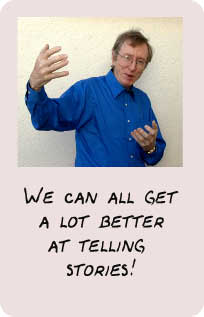|
|
Katalina Groh, Larry Prusak: Some of the world's leading thinkers |
| Storytelling to ignite change: Steve Denning |
 |
Becoming
a better storyteller
And so everyone can
do this. Everyone already knows how to tell stories, since they do it every
day of their lives, even if they are as unaware of it as fish may be unaware
of the water they swim in.
|
| that we usually havenít thought much about
using stories for a serious purpose. So this is something that does have
to be learnt.
And so although we are all storytellers already, we can all get better at storytelling. Much better. Particularly at using stories intelligently and explicitly to get effects that we explicitly plan ahead for and intend. As in any field of human activity, understand how and why storytelling works, and learning what kinds of stories work in different situations, and what kinds of effects different kinds of stories have, can enable us to be more adept in our own practice of storytelling. So there is a whole set of materials on storytelling on my website at www.stevedenning.com which explains some of the background and points to other resources on storytelling. My book, The Springboard: How Storytelling Ignites Action in Knowledge-Era Organizations, published by Butterworth Heinemann last October also tells the story of what happened in my storytelling at the World Bank and it also gives a great deal of detailed information and templates about how to use stories intelligently to get the springboard effect. But the main way to improve your ability to tell stories is of course to practice. Practice, practice, practice, and then more practice. And find a safe space to practice. You donít want to be telling a story for the first time to the executive committee of a large organization, because it is likely to have some unexpected effects. When I told the Pakistan story to the president and senior management of the World Bank in September 1998, I had already told the story a number of times to different audiences, and in the process, I had refined and honed and perfect the story so that it had exactly the effect that I intended with a wide range of different listeners. So when I told the story in that high-profile high-risk situation, I was extremely confident that it would have the effect that it did. And of course, that confidence in knowing the story well, helps the storyteller to be convincing and effective in telling the story. So practice, practice, practice, and again, more practice. Particularly in low-risk situations. You can do this with a friend, or a colleague, or a spouse, until you are comfortable with your performance. And we are offering workshops, where you can get help and coaching and mentoring on purposeful storytelling in organizations. We had a first workshop in Boston last December, and there will be more in London, and Boston and Copenhagen over the coming months. These provide a low-risk way to learn to become a better storyteller. The Smithsonian Associates are offering a symposium on storytelling on April 20-21 when Larry Prusak, and John Seely Brown and Katalina Groh and I will be talking about how storytelling is ďthe passport to the success in the 21st CenturyĒ. Weíll be showing about storytelling is a different way of understanding and interacting with the world, and why it is going to be so important in the years to come. Thatís my presentation. Iíd be happy to answer questions.. |
| Books and videos on storytelling *** In Good Company : How Social Capital Makes Organizations Work by Don Cohen, Laurence Prusak (February 2001) Harvard Business School Press *** The Social Life of Information, by John Seely Brown, Paul Duguid (February 2000) Harvard Business School Press *** The Springboard : How Storytelling Ignites Action in Knowledge-Era Organizations by Stephen Denning (October 2000) Butterworth-Heinemann *** The Art of Possibility, a video with Ben and Ros Zander : Groh Publications (February 2001) |
| The views expressed on this website are those of Stephen Denning, and not necessarily those of any person or organization |
| Site optimized in 800x600: webmaster CR WEB CONSULTING |
|
|
|
|